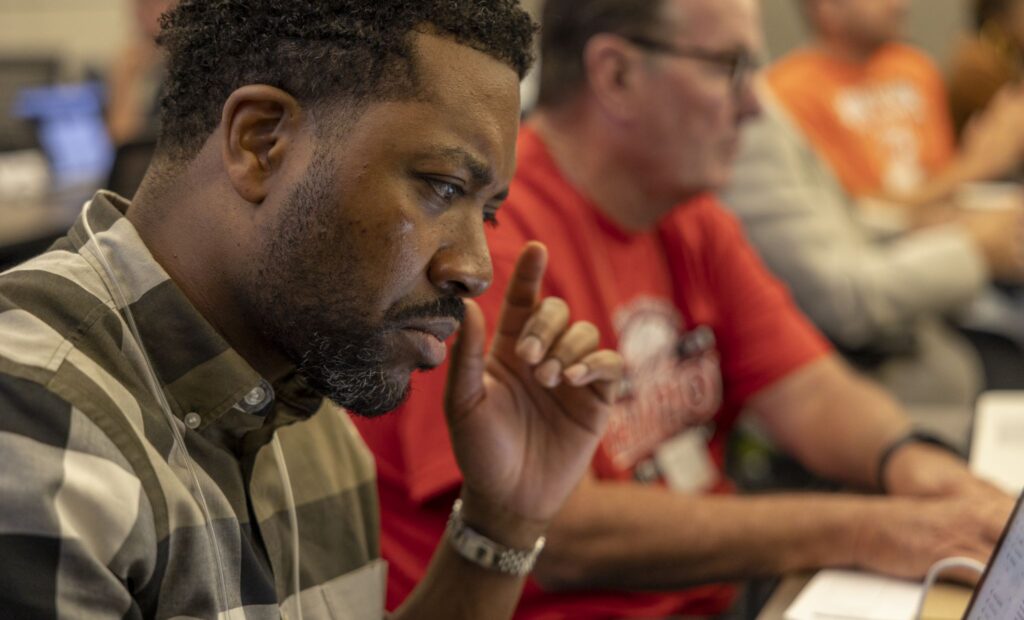As an education funder, we have long believed that highly effective teachers and school leaders are a critical piece to student success in the classroom. Over the years we’ve made some big investments in this area. Here’s what we’ve learned:
West Michigan Leadership Academy
In 2018, the Steelcase Foundation awarded a five-year $1.6 million grant to the New York City Leadership Academy (now The Leadership Academy) in partnership with the Doug and Maria DeVos Foundation to create the West Michigan Leadership Academy (WMLA). WMLA engaged principals and school leaders both within and across districts to envision the structures, systems, and practices needed to support equitable student learning and achievement in Grand Rapids. Each year, WMLA supported a cohort of approximately 20 principals and school leaders, who engaged together in a Professional Learning Network (PLN) for collaborative learning sessions around growing leadership capacity and advancing equity and anti-racist practice in their schools and districts and engaged one-on-one for three years of targeted coaching.
As the COVID-19 pandemic unfolded, the WMLA Advisory Board reimagined its structure and purpose to ensure principals and school leaders were supported, shifting to virtual instruction, to provide support around culturally responsive classroom instruction and leadership practices in remote learning environments. In addition, WMLA launched the Courageous Leadership Learning Series to supplement the Professional Learning Network and leadership coaching and provide additional support for principals and school leaders as they navigated the unprecedented challenges of the school year. The series brought together participants from all WMLA cohorts as they tackled challenges of practice around family engagement, antiracist policy change, and building educators’ resilience, and invited colleagues from outside of WMLA to attend as well.
This spring, we signed on for an additional two years of support to ensure that Cohorts 3 and 4 receive the intended dosage of support and collaboration as they continue in their journeys of becoming equity champions in their schools and districts. We appreciate the hard work of the principals and WMLA staff in their efforts to keep equity at the forefront through an ever-changing education landscape.
Education Trust – Midwest
In addition to our long-term support for principals and school leaders, since 2014 we have provided $3.35 million to Education Trust – Midwest (ETM) to support its Center for Excellence in Teaching and Learning (CETL), which seeks to improve academic outcomes and close racial and socioeconomic achievement gaps for low-income students and students of color in Kent County by increasing capacity for teachers through instructional support, coaching, consulting, data analysis, and technical assistance.
Through conversations with WMLA and other local educational support organizations, ETM elected to focus its efforts on providing coaching for educators to navigate the frequent and often abrupt shifts from in-person to virtual instruction, and the exacerbated inequities that resulted for many low-income students and students of color who lacked the tools and access needed to effectively engage in learning at home. ETM partnered with districts and teachers to tackle unique needs and equity challenges as they arose to ensure student needs were met during the disruptions, and teachers maintained a focus on accelerating learning. We appreciate ETM’s efforts to provide shoulder-to-shoulder support to teachers and districts as they navigated the challenges of delivering instructions throughout the pandemic.
Both projects highlighted the importance of providing flexible, relevant, and real-time support to teachers and principals as they navigated supporting students and families through a pandemic. While the initial intentions of the grants were close equity gaps that existed through traditional schooling, both organizations expertly pivoted to support the exacerbated needs and inequities that resulted as learning shifted to virtual. They provided timely resources and connections to other educators experiencing the same challenges to create a community of practice through unpredicted circumstances. Teachers and educators saw in real time how systemic inequities disproportionately affected their students and families and leaned in to fill gaps and ensure their students were safe and supported.
We hope as a community we can similarly lock arms to support our educators as they continue to take on the needs of students and families as we navigate life post-pandemic.
